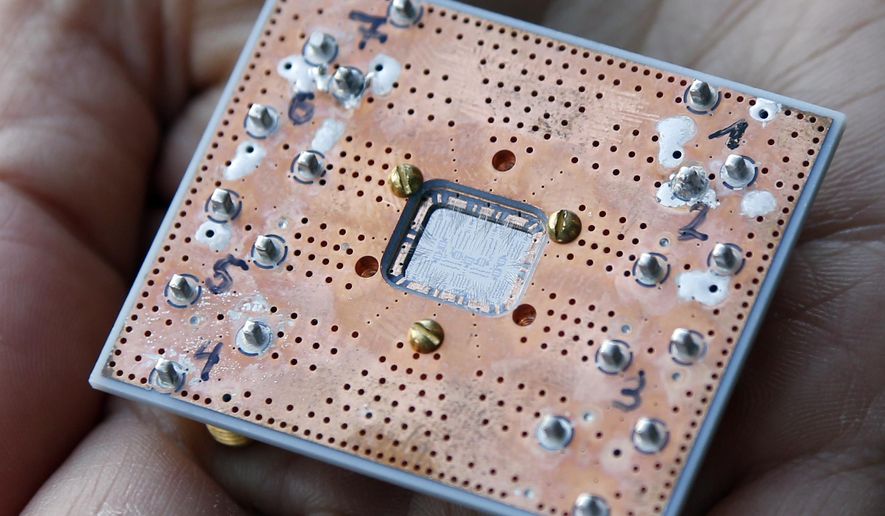The Pentagon has burgeoning initiatives to validate scientific discoveries and begin testing applications as it braces for a breakthrough to accelerate the arrival of revolutionary quantum computers.
Quantum computers pose significant risks and enormous opportunities for national security. The emergence of a “cryptanalytically relevant” quantum computer threatens to crack the encryption systems that secure defense secrets and everyday financial transactions.
The Defense Department’s primary objective for quantum computing is to understand its uses and prevent the power of the machines from falling into the hands of an adversary, said John Burke, the Pentagon’s principal director of quantum science.
In remarks at the Quantum World Congress, held this week in Northern Virginia, Mr. Burke outlined the military’s work to get its arms around the brave new world of quantum computing before an enemy does.
“There will be a time — and that time might come very soon, so we’re going to be open-minded to that — that quantum computing will be a very important application for useful applications for the [Defense Department],” Mr. Burke told the gathering. “That will change things dramatically if we have that evidence of utility.”
A quantum computer solves complex problems far faster than classical computers by using properties of superposition, interference and entanglement, according to President Biden’s National Security Memorandum 10.
In March, the National Security Agency said a cryptographically relevant quantum computer capable of current encryption systems did not yet exist.
Benchmarking
Mr. Burke, who works within the Pentagon’s research and engineering teams, highlighted two programs Tuesday to prepare the military for the quantum computing age.
The Defense Advanced Research Projects Agency is developing a Quantum Benchmarking Initiative to determine whether an industrially useful quantum computer can be built faster than the technology sector’s brightest minds anticipate.
According to DARPA’s website, the Pentagon program wants to know whether the value of such quantum computers will exceed their cost by 2033.
“It is really hard to evaluate a top-flight quantum computing company and to see if their approach really holds water, if they can really make it the distance to build an industrially useful machine in the near term,” Joe Altepeter, DARPA program manager, said in a video published in August. “But we are going to build that world-class verification and validation team.”
While DARPA investigates quantum developments to separate hype from reality, the Pentagon is working on a pilot program to use quantum technology for its forces in the field, in the sky and on the seas.
“We are also trying to get off the ground a program called DAQAR that’s a near-term quantum computing application program with the armed services and developing workforce, and really going after near-term applications like quantum computing,” Mr. Burke told the Quantum World Congress.
Mr. Burke pointed to a provision in the most recent annual National Defense Authorization Act establishing the pilot program for near-term quantum computing. The defense bill signed into law in December directs the Department of Defense to assess commercial quantum and quantum-hybrid applications for America’s warfighters.
CRQCs are far from the only machines relying on quantum technology expected to be useful to the military. Mr. Burke said the department is interested in quantum technology for clocks, magnetometers and inertial sensors, among other things.
Not so fast
Fredrik Fatemi, the Army’s senior research scientist for quantum, cautioned those attending the Quantum World Congress against the idea that quantum technology would emerge quickly.
He said the coming quantum leap would not be easy, fast or inexpensive.
“Quantum technology advancement is not a sort of field that advances because of a guy in a garage like you have in the movies,” Mr. Fatemi told attendees. “And large-scale collaboration is really critical, whether it’s reaching across the globe or next door.”
The military’s program for testing and validating quantum breakthroughs is open to U.S. and foreign companies. In DARPA’s video, Mr. Altepeter challenged anyone who thinks they can survive DARPA’s scrutiny to try.
Representatives from many foreign nations attending the Quantum World Congress know that dramatic change is on the horizon.
Jarmo Sareva, Finland’s consul general based in New York, said he sensed, based on conversations with participants at the gathering, that an enormous technological disruption was coming.
Mr. Sareva, whose previous postings included stops in Moscow and Washington, told attendees that the quantum future would upend people’s lives.
“There will be winners, there will be losers, but the disruption will also extend well beyond quantum information science and technology itself, so we need to be ready for that disruption,” Mr. Sareva said. “We don’t know when and how it comes and who will emerge as winners, but we need to be prepared.”
• Ryan Lovelace can be reached at rlovelace@washingtontimes.com.




Please read our comment policy before commenting.